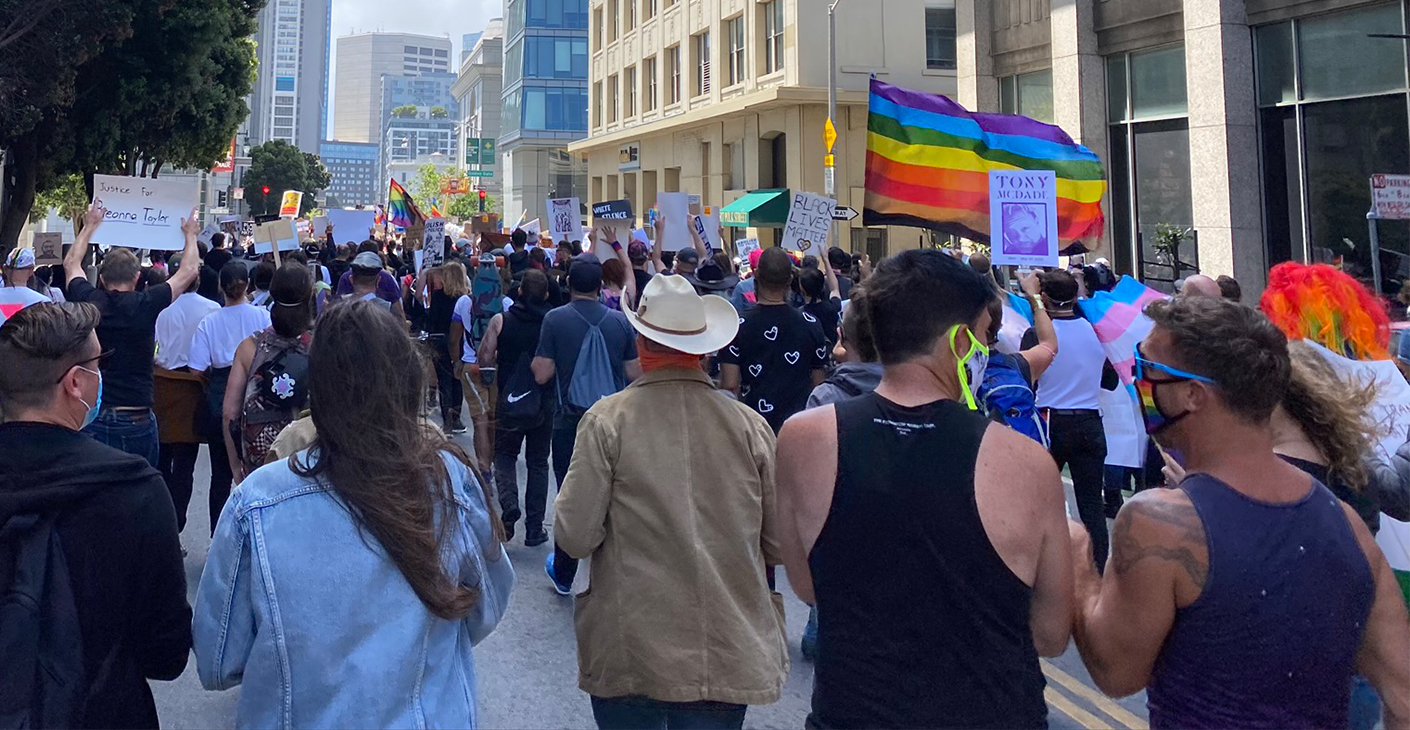A Pride Month note from Senior Philanthropic Advisor, J. M. Johnson.
Last year during Pride month, I reflected on reorienting ourselves with a focus on collective liberation, celebrating the progress we’ve made to date, and refreshing ourselves with the hope that a more just and joyful world is on the horizon. Progress can so often feel like we’re taking two steps forward, one step back – and lately we’ve had no shortage of giant steps backward.
On the heels of recent challenges, a Pride Month filled with hope and joy might be just what we need.
Perhaps, like me, you’ve felt your hope and joy withering as you learned about some of the 300 anti-trans and anti-LGBTQ bills proposed in state legislatures this year that would:
- Restrict access to health care
- Bar trans people from restrooms
- Prevent discussion of the existence of LGB or trans people in schools
- Bar trans youth from participating in sports
- Prevent updating government-issued ID documents to reflect our actual identities
On top of all this, the Supreme Court could use the same argument in overturning Roe v. Wade to turn back other landmark rights for queer people – including the freedom to marry (Obergefell v. Hodges), and even the right to intimate relationships for same sex couples (Lawrence v. Texas).
Bringing this down to a personal level for a moment: When I was six, my father pulled me out of gymnastics classes. Permanently. At that age, gymnastics was essentially a dance class with added cartwheels and roundoffs: we wore cute outfits and performed routines to music, and I had two close gal pals with whom I enjoyed every moment of our jubilant troupe. What made me thrive made my father afraid and angry. He thought that the environment was going to turn me gay.
Before they even become policy, proposed laws and leaked decisions like those mentioned have devastating impacts on the mental, emotional, and physical wellbeing of queer folks – simply by forming the contours by which our society discusses the freedom (or lack of freedom) to be LGBTQ. My heart breaks for the kids who won’t be able to play the sport they love, who won’t pursue the art that makes them feel alive, who won’t get the medical care they need, who won’t feel safe expressing core pieces of who they are, and who won’t know how to support their friend who is grappling with their gender or orientation because learning this skill has been prohibited.
Societies are measured by how they treat their most vulnerable members. I often think about Margaret Mead’s assertion that the first sign of true civilization is fossil evidence of a healed femur. For any mammal in the wild, a broken femur is an immobilizing death sentence; binding the wound and keeping that individual alive, hunting and gathering on their behalf, and caring for them throughout a significant healing period at personal cost and peril – this, to Mead, defined the birth of civilization.
Race, gender, sexuality, ability – these are all identities which can make us vulnerable because of the multiple intersecting systems which have been designed to benefit those with some identities more than – and at the expense of – others. Yet civilization is predicated on compassion across our differences. Oppressive systems harm groups differently based on their identities, but our eventual liberation is bound together. Pride reminds us of the power of a movement, built by people working across their layered identities, to change things to make our society better for all of us.
Pride is a joyful recognition of innate and beautiful parts of our humanity that were previously (to an extent, and yet also currently) policed and punished in our society. It celebrates the crumbling of one class of the oppressive systems that we are surrounded by, which do not honor our universal human dignity. Full liberation feels a long way away, but it’s important and necessary that we choose to celebrate along the way.
Exploitative systems seek to reinforce themselves and suppress or profit from our joy, cultural expression, and love, but, for queer people, choosing joy has a deep capacity to produce healing. That healing from exploitative systems is necessary to sustain the continuing work toward our collective liberation – yes, including the liberation of those who, in their zero-sum thinking, thought they had something to gain in controlling and exploiting us.
I am reminded of Mariame Kaba’s words:
“Hope isn’t an emotion, you know? Hope is not optimism. Hope is a discipline…we have to practice it every single day.”
Joy is also a discipline, and along with hope, one that I’m refocusing my attention on cultivating this Pride month.
If you are inclined to support organizations working on LGBTQ issues during Pride, I encourage you to check out “Give OUT Day,” a month-long fundraising campaign culminating on June 30. There you can find organizations all across the country doing critical work to defend the rights of LGBTQ people, and also to help us thrive as individuals and as a community.
I also invite you to check out this small collection of Bay Area groups, curated by the SFF LGBTQ2SIA+ employee affinity group, which are inspiring us with their hopeful and joyful service to our community.


